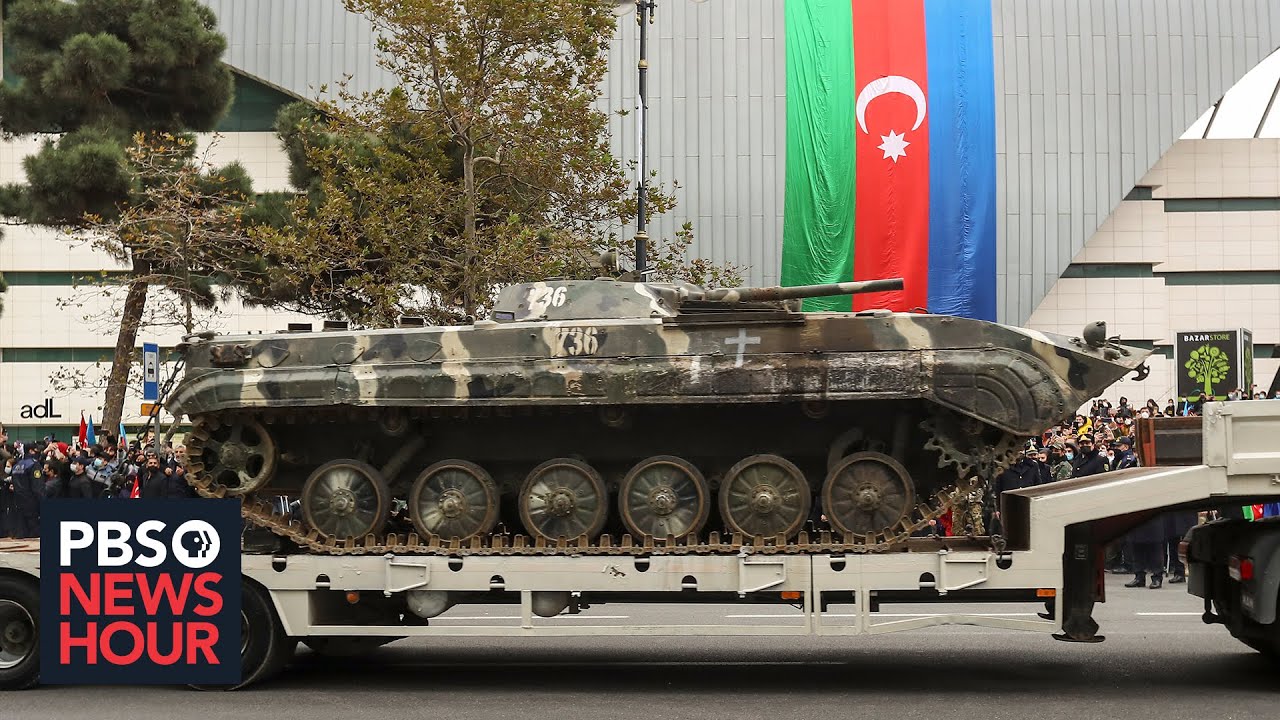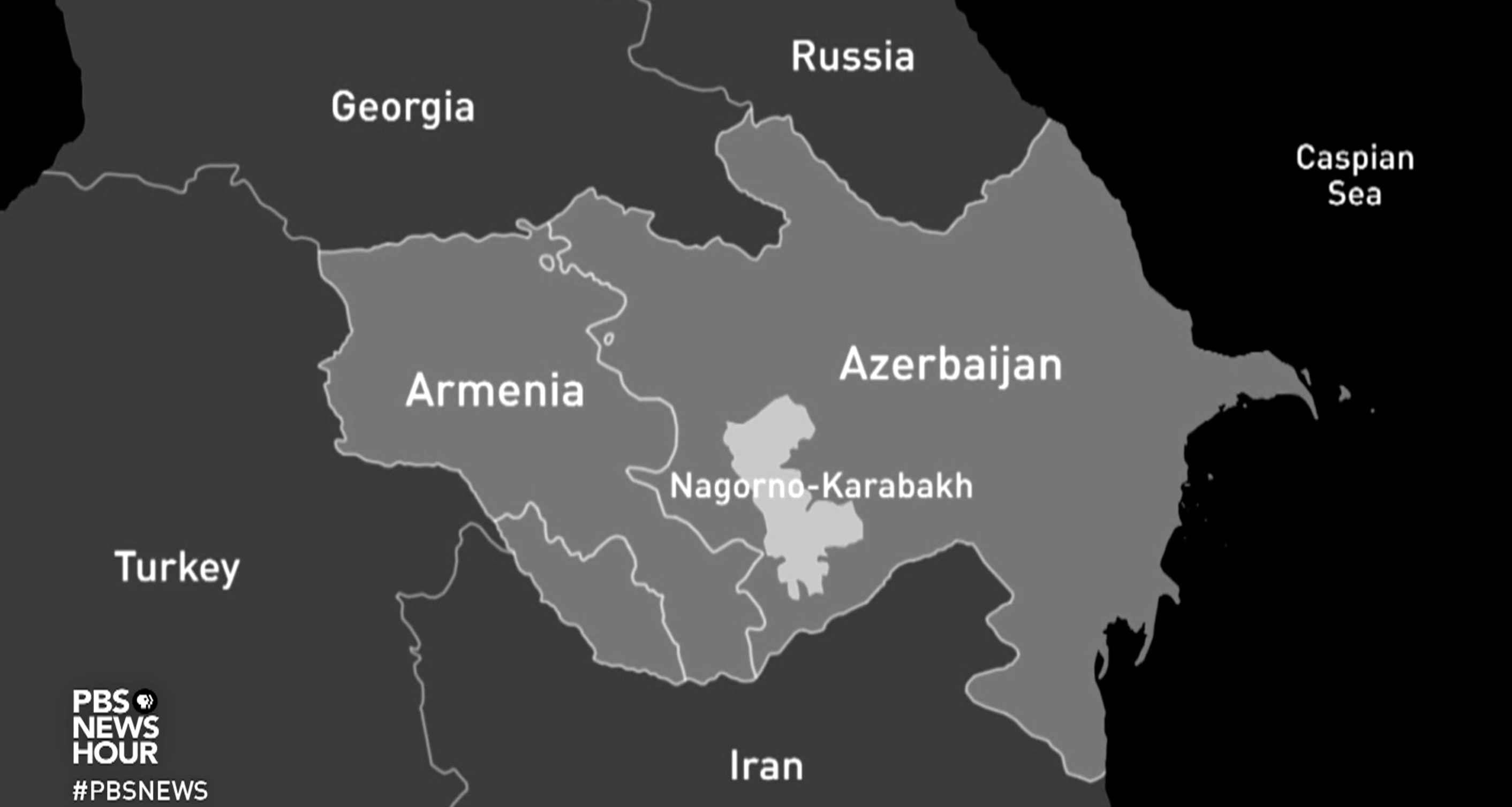
Just over a month ago, Armenia lost control of the Nagorno-Karabakh region in a short-lived and brutal war with Azerbaijan. But while Armenian forces have handed these territories back to Azerbaijan it may be a long time before civilians return to them safely, with hundreds of miles of front line to de-mine and evidence of war crimes. Special correspondent Simon Ostrovsky reports.
Read the Full Transcript
Judy Woodruff:
Nearly three months ago, a dormant conflict on the fringes of Europe broke into brutal warfare. The former Soviet republic of Armenia and Azerbaijan went to war again over the enclave of Nagorno-Karabakh, drawing in regional powers.
Now, after the Azerbaijani victory, as special correspondent Simon Ostrovsky tells us, with the support of the Pulitzer Center, peace will be a hard bargain.
And a warning:
Some images in this report may disturb viewers.
Simon Ostrovsky:
Earlier this month, allies reviewing the captured spoils of a brutal war, Azerbaijan's President Ilham Aliyev with Turkish President Recep Tayyip Erdogan on the capital Baku's main square.
Column after column of captured Armenian weapons rolled by in a victory parade to celebrate neighboring Armenia's defeat and the capture of a larger prize, the Nagorno-Karabakh region, after the latest war over Karabakh ended November 9, a decidedly unusual, even repellent spectacle for modern Europe.
But these are dark times in this corner of the continent, where Turkey, Russia and Iran intersect. Just over a month ago, Armenia lost control of these areas of Azerbaijan, which it held since the end of the first war between Azeris and Armenians here in 1994. Now the Azerbaijani and Turkish leaders exult in their popularity.
Ilham Aliyev (through translator):
The famous Bayraktar drone, which is made by the Turkish defense industry, was a game-changer and played an important role in our success.
Simon Ostrovsky:
Azerbaijan's successful military campaign was helped by Turkish know-how and drone technology. It will shape the geopolitical map for years to come in this vital region.
Russia, Turkey's rival in theaters as diverse as Karabakh, Syria and Libya, seems to have secured a place on that map. It wielded its influence with Armenia and Azerbaijan to broker a deal that not only ended the fighting, but secured a role for its military in the contested enclave in the form of peacekeeping troops.
RECEP TAYYIP ERDOGAN, Turkish President (through translator):
I have to mention Mr. Putin's approach. His approach made it possible to carry this process out in a positive manner and get things to where they are.
Simon Ostrovsky:
While Azerbaijanis are jubilant over the return of lands long coveted, some worry that the Russians are there to stay.
Elnur Aliyev (through translator):
In my opinion, it's bad that the Russian peacekeepers arrived. They should not have come. At minimum, Russia is a country that helps Armenia and sends peacekeepers. If Turkey came, yes, but I don't approve of Russian peacekeepers.
Simon Ostrovsky:
More frequently, though, responses like this one when we asked residents of Baku what they thought of the Russian presence:
Woman (through translator):
We trust our president. He knows everything very well. It must have been the right decision.
Simon Ostrovsky:
Armenian forces may have handed these territories back to Azerbaijan, but it might be a long time before civilians can come back here safely. There's hundreds of miles of front line to de-mine.
But it's not just about clearing unexploded ordnance. If civilians from both sides are to return to these areas, painful steps toward reconciliation must first take place. That includes the prosecution of war criminals.
Rachel Denber is a deputy director of Human Rights Watch.
Rachel Denber:
It's imperative for a couple of reasons. First, it's imperative as a deterrent to ensure that these crimes don't repeat, to send a very strong signal to — throughout the chain of command, from the highest level to the lowest level, that these kinds of actions will not be tolerated and that they will be vigorously punished.
But it's also — it's also important for a sense of justice and a sense of security.
Simon Ostrovsky:
While Azerbaijan's leader promised to govern regained territory for the benefit of both the Azeri and Armenian communities, his troops are sending another message.
Here, they chant, "They will destroy Armenians."
And, here, just a small sample of the gruesome footage that has emerged from this conflict. A soldier cuts off the ear of a dead Armenian fighter.
In its war to take back control of Karabakh, Azerbaijan is accused of war crimes, including the beheading, mutilation and humiliation of Armenian fighters and civilians, according to recent reports by both Amnesty International and Human Rights Watch.
And while Armenians also stand accused of humiliating captive soldiers and killing at least one POW, they didn't mistreat any civilians, possibly because their troops were in the retreat. That puts the onus on Azerbaijan to show first and foremost that it's serious about being a just steward for everyone who will live here.
For the "PBS NewsHour," I'm Simon Ostrovsky in Nagorno-Karabakh.





